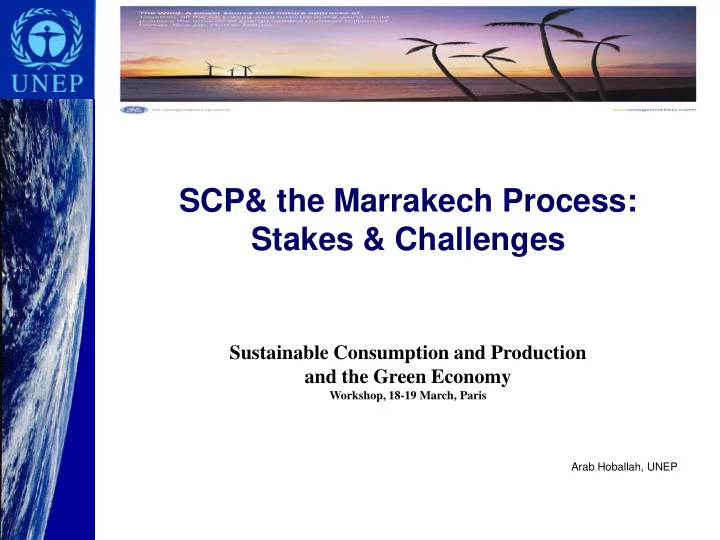

SCP& the Marrakech Process: Stakes & Challenges Sustainable Consumption and Production and the Green Economy Workshop, 18-19 March, Paris Arab Hoballah, UNEP
Challenges & Opportunities • Challenges: Pollution & Impacts env. & health; risks; CC; Degradation & depletion of resources Individual v/s common goods Poverty; Food crisis Cons. & Prod. Patterns • Opportunities: Env. & SD Policies Env, an economic stake More Responsible actors Awareness of consumers Scientific & social genius of humankind//Innovation
Resource Efficiency & SCP Of concern to & direct responsibility of Gvt/public, private/business, research and consumers; Scope of activities evolving: production processes to products to product-systems sustainable innovation sustainable consumption. Through policy reforms, culture of change & relevant tools/LCA Drivers: pollution, cleaner, risks, responsibility, decoupling, efficiency, economic return/cost/benefit, SCP
What is SCP? • “ the production and use of goods and services that respond to basic needs and bring a better quality of life, while minimizing the use of natural resources, toxic materials and emissions of waste and pollutants over the life cycle, so as not to jeopardize the ability to meet the needs of future generations. ” (Norwegian Ministry of Environment, Oslo Symposium, 1994). – Cross-cutting in character, – active involvement of all stakeholders – wide range of locally-adapted policy responses. – Meeting basic needs in a sustainable manner – decoupling of economic growth from environmental degradation.
UNEP’s work on SCP • The overall objective of the SCP is to: promote and facilitate the extraction, processing and consumption of natural resources in a more environmentally sustainable way over the whole life cycle. • SCP is about increasing resource efficiency and promoting sustainable lifestyles. It offers important contributions for poverty alleviation and the transition towards low-carbon and green economies. 5
The citizen paradox I’d like to end poverty, stop violence and racism, and get rid of pollution. Everyone should be equal. I want to dress in the nicest clothes, drive a great car, talk on the latest mobile phone, and watch my brand new DVD
The business paradox Integrate environment, produce cleaner, mainstream CESR, health & security, etc Investments, costs, benefits, competition, markets, etc
UNEP’s work on SCP • Our main target is to contribute to the decoupling of growth in production and consumption of goods and services from resource depletion and environmental degradation, and to strengthen the scientific base for doing so. • We do that by focusing on: reforms in government policies, changes in private sector management practices and decisions, and increased consumer awareness, to achieve this. 8
SCP highlights • Development of Regional SCP Framework/ Programmes through the Marrakech Process • Support to development of national and local SCP action plans and initiatives • Capacity building and demonstration of resource efficient and cleaner production in industries • Promoting partnerships and dialogue with business and industries on SCP • International Panel on Sustainable Resource Management 9
SCP highlights in more detail • Initiatives/programmes such as – UNEP/SETAC Life Cycle Initiative – Sustainable Buildings and Climate Initiative – Education and Lifestyles (YouthXchange) – Sustain. Public Procurement & Sustainable UN – CESR, Global Compact, GRI • Sectors such as • Tourism • Waste • Agri-food • Buildings and construction 10
The Marrakech Process on SCP is A dynamic multi stakeholder process & platform that supports: 1. Responds to WSSD JPOI call to accelerate the shift towards SCP & decoupling economic growth from environmental degradation. 2. The implementation of projects and programmes on SCP (policy design, capacity building, guidelines) based on regional &national priorities, & multi-stakeholder partnerships/initiatives 1. The 10 Year Framework of Programmes/10YFP, to be further developed and launched during the UNCSD 18-19 cycle in 2010 and 2011 2. MP & the 10 YFP will help countries & regions build the basis for Green Economy and ultimately deliver SCP;
Towards a 10 Year Framework of Programmes on SCP Main objectives : • mainstream sustainable use and management of natural resources • Scale up & speed up progress to meet the MDGs • Support existing MEA’s including climate change • Decouple economic growth from environmental degradation • Stimulate demand & supply of sustainable products and services • Promote more sustainable lifestyles, cities and societies; • Enhance social equity through investment in people and communities.
Marrakech Task Forces Sustainable Sector- Sustainable Buildings & Tourism (F) focused Construction (FIN) Seven Sustainable Sustainable Marrakech Products (GB) Lifestyles (S) Task Forces Education for Sustainable Sustainable Public Consumption (I) Procurement (CH) Cooperation Policy tools and with Africa (D) Social & programmes behavioural Regional- issues focused
Influencing consumption and production patterns ... – underlying drivers for consumption; – obstacles and opportunities for change – Improvement of processes, products and services -> business – Modernization of infrastructure and policy frameworks -> governments – Awareness, dialogue and reflection -> consumer groups – At each level, need economic case, policies, tools, costs/benefits.
10-Year Framework of Programmes on SCP using a Life Cycle Approach
SCP & GE SCP: a Goal GE to assist for + advocating and improved delivery for achieving SCP GE a set of instruments for achieving this goal in the context of SD Identify/define econ policies & measures Identify market instruments/incentives Value cost of action/inaction, lost opportunities Make econ case to support assessment & decision making for: Leapfrogging Value added of SCP in developing countries Resource efficiency & Dematerialization Thank you
Recommend
More recommend